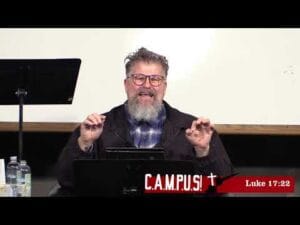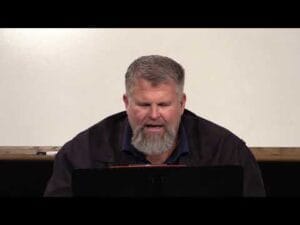
Luke 18:18-30 Bible Teaching
Salvation requires faith in Jesus, not just good deeds. True goodness is God's alone. Wealth can hinder spiritual growth. Eternal life needs divine grace, not human effort.

Verse by Verse Teachings is an in-depth, methodical study of the Bible led by Shawn McCraney. Launched in 2013, these teachings are dedicated to helping individuals understand every single verse scripture in its purest, most contextual form—free from institutional biases or doctrinal agendas.
Whether you’re new to the Bible or seeking deeper insights, these teachings will equip you to understand the text in historical, cultural and exegetical context – outside of the bounds of religious tradition.

Salvation requires faith in Jesus, not just good deeds. True goodness is God's alone. Wealth can hinder spiritual growth. Eternal life needs divine grace, not human effort.

Luke 18 teaches persistent prayer, humility, childlike faith, and contrasts self-righteousness with humble contrition. Emphasizes justice, patience, and God's timing.

Shawn's teaching on Luke 17:22-end warns of false prophets, emphasizes vigilance, compares end times to Noah and Lot, and discusses the sudden return of Jesus.

Faith is foundational, enabling love and forgiveness. Jesus teaches faith's power, humility, gratitude, and the internal Kingdom of God, emphasizing spiritual over ritual.

Shawn's teaching on the parable of the rich man and Lazarus highlights the contrast between earthly wealth and spiritual fulfillment, emphasizing repentance, forgiveness, and genuine faith.

Jesus teaches the impossibility of serving both God and wealth, using the parable of the rich man and Lazarus to illustrate spiritual consequences and the importance of prioritizing God over material desires.

The teaching contrasts the prodigal son's parable with the unjust steward's, highlighting themes of grace, forgiveness, accountability, and wise use of resources for spiritual growth.

Luke 15's parables of the lost sheep, coin, and prodigal son highlight repentance, redemption, and joy, emphasizing God's joy in sinners' repentance and the value of individual restoration.

Shawn's teaching uses Jesus' parable of a great feast to illustrate the Kingdom of God, emphasizing humility, service, open invitation, and prioritizing faith over worldly ties.

Jesus challenges Pharisees' Sabbath views by healing, teaching compassion over legalism. Emphasizes humility, inviting marginalized, promising divine rewards over earthly.

Jesus teaches striving for the narrow gate to God's Kingdom, warns of exclusion for delay, laments Jerusalem's resistance, and predicts Gentiles' inclusion and Pharisees' delay.

Luke 13: Jesus teaches repentance, not tragedy, as a sign of sin. Parables of the fig tree, mustard seed, and leaven stress spiritual growth. He heals on the Sabbath, challenging legalism.

Jesus stresses prioritizing God's kingdom, spiritual readiness, and internal righteousness. He warns of division, accountability, and the need for reconciliation.

Shawn emphasizes reliance on the Holy Spirit, prioritizing spiritual over material wealth, and trusting God's provision, warning against covetousness and worldly concerns.

Shawn's teaching highlights religious leaders obstructing spiritual truths, Jesus' warnings on Pharisees' hypocrisy, God's dual authority, and unforgivable blasphemy against the Holy Spirit.

Jesus criticizes Pharisees for hypocrisy, focusing on rituals over inner purity, neglecting justice and love. Emphasizes humility, equality, and true spiritual integrity.

Shawn's teaching asserts "this generation" in Jesus' words refers to his contemporaries, not future audiences, emphasizing repentance, inner light, and true wisdom over worldly pursuits.

Jesus warns against division, counters accusations of using demonic power, emphasizes God's kingdom, and stresses internal unity and adherence to God's word for true blessings.

Jesus' power over demons shows God's might; neutrality isn't an option in spiritual battles. Satan, once a proud angel, fell and tempts humanity. Jesus' victory over Satan leads to spiritual renewal and eternal life for believers.

Jesus taught prayer as a relationship with God, emphasizing persistence, forgiveness, and divine provision. Shawn highlights differences in Gospel accounts, focusing on praying to the Father, the role of Jesus' name, and the Kingdom's fulfillment. Persistence in prayer is key, with spiritual gifts prioritized over material needs.